The Alberta Family Wellness Initiative (AFWI) is a catalyst for concrete action and change to advance the understanding and approach to sensitive periods of brain development and its lifelong impact on health outcomes.
The direction of the AFWI has been informed by sharing the Brain Story and Resilience Scale in community and receiving feedback. Since the founding of the AFWI, there has been a continuous effort to conduct evaluations which both document progress and identify areas for improvement. The following is a chronological list of evaluation reports commissioned or produced by the AFWI, as well as an overview of some of their key findings.
Visit this link to read all of the reports.
2025 Evaluating Implementation of the Brain Story and Resilience Scale Framework: Current Opportunities (Presented by NORC at the University of Chicago)
Read the Report
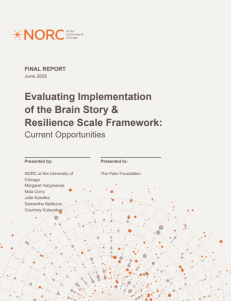 Overview: In March 2024, the Palix Foundation commissioned researchers from NORC at the University of Chicago to develop an evaluation framework to support multi-level implementation of the Alberta Family Wellness Initiative’s Brain Story and Resilience Scale Framework in select communities across Alberta. The researchers from NORC reviewed evidence on existing measurement instruments and met with community members in several Albertan communities to gather resilience-related metrics, and to develop an implementation evaluation framework.
Overview: In March 2024, the Palix Foundation commissioned researchers from NORC at the University of Chicago to develop an evaluation framework to support multi-level implementation of the Alberta Family Wellness Initiative’s Brain Story and Resilience Scale Framework in select communities across Alberta. The researchers from NORC reviewed evidence on existing measurement instruments and met with community members in several Albertan communities to gather resilience-related metrics, and to develop an implementation evaluation framework.
Main Findings: Overall, communities and organizations are highly motivated and excited about the potential of the Brain Story and Resilience Scale Framework to enhance services and strengthen community resilience. However, to support successful implementation, it is important to acknowledge and address challenges, such as funding requirements driving evaluation efforts, imbalance of identifying adversities more than positive supports and efforts to improve skills and abilities, and staff burnout. The implementation evaluation framework presented in this report provides key indicators to assess the feasibility, uptake, and utility of the Brain Story and Resilience Scale Framework. This evaluation framework can help organizations and communities assess and monitor their implementation efforts.
2021 Early Learnings About Uses for the Resilience Scale Metaphor in Practice (Presented by FSG 2021)
Read the Report
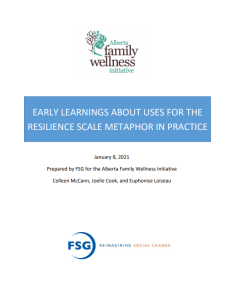 Overview: From June-November 2020, the AFWI convened a community of practice (CoP) in which eight organizations participated. Each of these organizations had deep familiarity with the brain science concepts encapsulated in the AFWI’s Brain Story Certification Course, including resilience, and saw integrating the resilience scale into practice as a natural extension of work they had been doing for some time. To inform the learnings, FSG interviewed each of the participants in the resilience scale CoP (13 individuals from eight organizations), observed bi-weekly CoP meetings, and reviewed relevant research and supporting documents.
Overview: From June-November 2020, the AFWI convened a community of practice (CoP) in which eight organizations participated. Each of these organizations had deep familiarity with the brain science concepts encapsulated in the AFWI’s Brain Story Certification Course, including resilience, and saw integrating the resilience scale into practice as a natural extension of work they had been doing for some time. To inform the learnings, FSG interviewed each of the participants in the resilience scale CoP (13 individuals from eight organizations), observed bi-weekly CoP meetings, and reviewed relevant research and supporting documents.
Main Findings: Early learnings from organizations using a dynamic, interactive visual or physical model of the scale in practice suggest that it can be a powerful way to communicate about the components of resilience and how it is built. The beauty of the resilience scale metaphor is that it provides a simplifying frame for the complex scientific concepts embodied in it, and it is effective across stakeholder groups, including frontline staff, clients or patients, and funders.
2020 From Knowledge to Action: Using Brain Story Science to Improve Outcomes for Children and Families in Alberta (Presented by NORC at the University of Chicago)
Read the Report
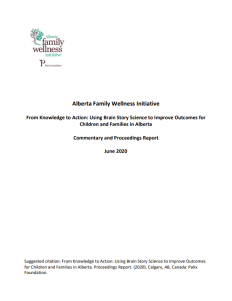 Overview: In 2019, the Palix Foundation planned and hosted symposia in Edmonton and Calgary called “From Knowledge to Action: Using brain story science to improve outcomes for children and families in Alberta,” attended by more than 200 leaders, practitioners, and policy makers from a wide range of disciplines. This report summarizes the findings for the meetings.
Overview: In 2019, the Palix Foundation planned and hosted symposia in Edmonton and Calgary called “From Knowledge to Action: Using brain story science to improve outcomes for children and families in Alberta,” attended by more than 200 leaders, practitioners, and policy makers from a wide range of disciplines. This report summarizes the findings for the meetings.
Main Findings: This is an ambitious plan for brain story science in Alberta, but the Palix Foundation has already had spectacular success, transforming practitioners, program practices, and institutions throughout Alberta and beyond. At this point, brain story science is ready to be scaled and AFWI has a roadmap for how brain story science can be scaled up (impacting greater numbers), scaled out (impacting laws and policy), and scaled deep (impacting cultural roots). Transformation at this scale requires collective capacity beyond the resources of any one organization, and many allies are ready for this next step.
2019 Brain Story Certification Course Feedback Report (Presented by the Palix Foundation)
Read the Report
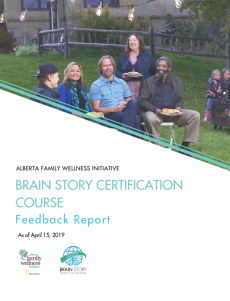 Overview: This report summarizes feedback about the Brain Story Certification Course collected between 2016-2019. The evaluation consists of data collected through post-course surveys, feedback sessions with groups and organizations taking the course, an AFWI community facilitator process, learning circles, and testimonial videos.
Overview: This report summarizes feedback about the Brain Story Certification Course collected between 2016-2019. The evaluation consists of data collected through post-course surveys, feedback sessions with groups and organizations taking the course, an AFWI community facilitator process, learning circles, and testimonial videos.
Main Findings: The course is filling a knowledge gap and demand continues to increase. Particularly noteworthy is the observation that many organizations both large and small are now making the course a mandatory component of staff professional development and/or requiring it as part of the recruitment process. Feedback on common barriers and challenges include: effectively influencing upstream efforts, achieving collective understanding about the importance of the knowledge in creating a continuum of care, and overcoming barriers to systematically implement the course within organizations and institutions (e.g., time to complete the course).
2019 Embedding the Brain Story (Presented by Nathaniel Foote & James Radner, TruePoint)
Read the Report
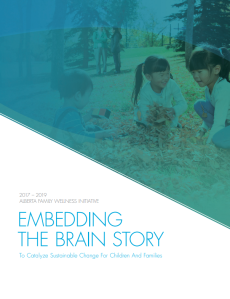 Overview: Foote and Radner reviewed results from the AFWI’s developmental evaluation in order to make suggestions as to the future direction of the Foundation.
Overview: Foote and Radner reviewed results from the AFWI’s developmental evaluation in order to make suggestions as to the future direction of the Foundation.
Main Findings: The AFWI has achieved remarkable success in its core knowledge-mobilization strategy. As these efforts mature, the Palix Foundation and the AFWI are poised for a significant shift to focus “downstream”—mobilizing knowledge with individual change agents, catalyzing organizational and systems change, building on that success, and embedding knowledge at the front lines—all to catalyze direct change for children and families. In particular, a deep focus on professional development and training, as well as embedding the Adverse Childhood Experiences (ACEs) tool as a standard in front-line practice, can provide a robust platform for improving practices and outcomes, as well as for continuing to influence policy and organizational change.
2014 Developmental Evaluation (Presented by FSG)
Read the Report
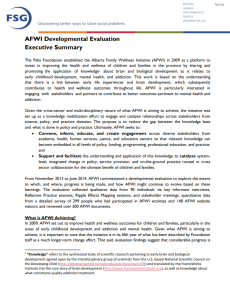 Overview: In 2014, to gain a clear picture of its early progress, the AFWI commissioned a developmental evaluation. The evaluation shows where the AFWI was most and least effective during its initial years, consisting of qualitative data from 90 people through interviews, stakeholder meetings, Reflective Practice sessions, and Ripple Effects Mapping sessions; it also includes quantitative data through a survey of 299 AFWI activity participants, 148 website visitors, and more than 500 AFWI documents.
Overview: In 2014, to gain a clear picture of its early progress, the AFWI commissioned a developmental evaluation. The evaluation shows where the AFWI was most and least effective during its initial years, consisting of qualitative data from 90 people through interviews, stakeholder meetings, Reflective Practice sessions, and Ripple Effects Mapping sessions; it also includes quantitative data through a survey of 299 AFWI activity participants, 148 website visitors, and more than 500 AFWI documents.
Main Findings: As a knowledge-mobilization initiative, the AFWI provided individuals and groups with a scientific knowledge base, a core story of brain development, and access to a cross-sector, multi-disciplinary network. The evaluation shows that these tools caused individuals to shift their understanding of brain development, lifelong health, and addiction; individuals also shifted their attitudes and work strategies, and, in many cases, developed plans to bring their organizations in line with new knowledge about brain science. As individuals became change agents they began to shift conversations, cultures, and practices at their organizations. The evaluation noted changes at this level, such as practitioners using the core story to speak to clients and patients, researchers and educators adjusting academic curricula, and agency staff refocusing programs, proposals, and services.
